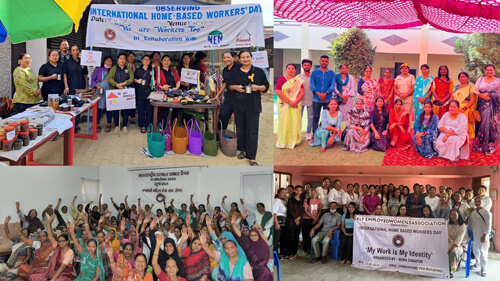


SEWA members demand their role be recognised in circular economy, fair & minimum wages & activation of welfare boards and schemes.
International Home-based Worke
The Self Employed Women’s Association (SEWA) which has 2.9 million organized workers and champions the cause and rights of lakhs of home-based workers held events across 18 states of India to mark the historic occasion. Consultations and meetings were held between key stakeholders, memorandum of demands were submitted to the governments in the state and centre while elaborate programmes were held to generate awareness on the International Labour Organisation (ILO) Convention 177 (Home Work Convention), the challenges faced by lakhs of home-based workers in India and remedies that need to be implemented to offer fair wages and support to these very crucial work group of the circular economy.
In Ahmedabad, Gujarat, SEWA sisters organised a meeting to generate awareness on e-shram cards, Occupational Health & Safety (OSH), impact of climate change and mitigation strategies for home-based workers. A memorandum with demands from the home-based workers trade committee was submitted to Shrutiben Modi, Additional Commissioner of Labour, Government of Gujarat. The demands include activation of the Gujarat Unorganized Workers Welfare Board, social security benefits and minimum wage on piece rate for home-based workers.
In the national capital of New Delhi, SEWA organized consultation in collaboration with Women in Informal Employment: Globalizing and Organizing (WIEGO) on visibility and recognition of home-based workers in India. The role of home-based workers in the circular economy and wages paid to them in different Indian cities were analyzed at the consultation. Home based worke
In Rajasthan, SEWA organised a meeting in Bikaner city wherein more than 200 home-based workers
In north-eastern India in Nagaland, the day was celebrated in three districts – Kohima, Dimapur and Shamator with meetings organized on the theme of “my work is my identity”. An awareness building on ILO’s C177 among members and release of a song dedicated to home-based workers was held. Sisters stressed on the need for recognition of home-based work in India. An exhibition of products manufactured by the home-based workers were also displayed at the event.
SEWA has spearheaded the ILO Convention 177, known as The Home Work Convention in 1996 but despite its 27-year existence only 13 countries have ratified it which has no Asia Pacific nations. There are no comprehensive policies that specifically recognise and safeguard the rights of home-based workers. SEWA urges the Government of India to develop policies and guidelines for home-based workers aligned with ILO Convention 177 and lastly, ratify Convention 177.
RECOGNISING & PROTECTING RIGHTS OF HOME-BASED WORKERS
*The 5th ITUC-Asia Pacific Regional Conference, Bangkok, Thailand, 20-22 November 2023 expressed serious concern over the lack of recognition, protection, and the absence of fundamental rights for home-based workers.
*It acknowledged that in South Asian countries such as Bangladesh, India, Nepal, and Pakistan, there are estimated 67 million home-based workers mainly women who work in complex and lengthy supply chains, often at bottom tier of this chain, and face exploitation, endure extended working hours, receive inadequate remuneration, do not benefit from minimum wage regulations, and suffer from the absence of social protection. It regretted that continued absence of comprehensive policies that explicitly recognise and protect the rights of home-based workers in the majority of countries in the region.
RESOLUTION TO TAKE ACTION
*Call upon all governments in Asia and the Pacific region to ratify ILO Convention 177 and develop comprehensive policies and guidelines for home-based workers aligned with the Convention; urge governments to undertake data collection efforts to assess data on the numbers, working conditions, and characteristics of home-based workers across the Asia Pacific region.
*Demand governments in the region to implement the recommendations derived from the ITUC-AP/SEWA Action Research Survey on home-based workers.